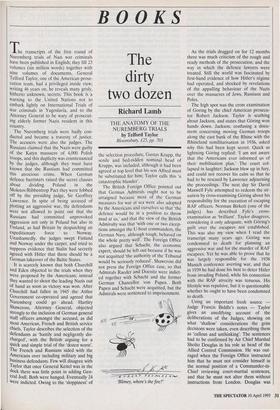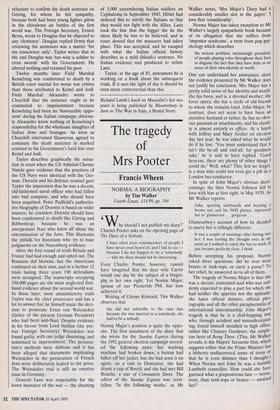BOOKS
The dirty two dozen
Richard Lamb
THE ANATOMY OF THE NUREMBERG TRIALS by Telford Taylor Bloomsbuty, £25, pp. 703 he transcripts of the first round of Nuremberg trials of Nazi war criminals have been published in English; they fill 23 volumes (six million words) together with nine volumes of documents. General Telford Taylor, one of the American prose- cution team, had a privileged inside view; writing 46 years on, he reveals many grisly, hitherto unknown, secrets. This book is a warning to the United Nations not to embark lightly on International Trials of war criminals in Yugoslavia, and to the Attorney General to be wary of prosecut- ing elderly former Nazis resident in this country.
The Nuremberg trials were badly con- ducted and became a travesty of justice. The accusers were also the judges. The Russians claimed that the Nazis were guilty of the Katyn massacre of 4,000 Polish troops, and this duplicity was countenanced by the judges, although they must have known that the Russians had committed this atrocious crime. When German defence barristers raised the secret clauses about dividing Poland in the Molotov/Ribbentrop Pact they were fobbed off by the presiding judge, Sir Geoffrey Lawrence. In spite of being accused of Plotting an aggressive war, the defendants were not allowed to point out that the Russians had committed unprovoked aggression not only in Poland but also in Finland, as had Britain by despatching an expeditionary force to Norway. Unashamedly, the judges swept Finland and Norway under the carpet, and tried to suppress evidence that Stalin had secretly agreed with Hitler that there should be a German takeover of the Baltic States.
It is scarcely known that both Churchill and Eden objected to the trials when they were proposed by the Americans; instead they wanted to shoot the leading Nazis out Of hand as soon as victory was won. After Churchill had fallen in 1945 the Attlee Government co-operated and agreed that Nuremberg could go ahead. Hartley Shawcross, Attorney General, objected strongly to the inclusion of German general staff officers amongst the accused, as did most American, French and British service Chiefs. Taylor describes the selection of the defendants as 'hastily and negligently dis- charged', with the British arguing for a quick and simple trial of the 'dozen worst'. The French and Russians sided with the Americans over including military and big business defendants. Few will disagree with Taylor that once General Keitel was in the dock there was little point in adding Gen- eral Jodl. Both were hanged. Eventually 24 were indicted. Owing to the `sloppiness' of the selection procedure, Gustav Krupp, the senile and bed-ridden nominal head of Krupps, was included, although it had been agreed at top level that his son Alfred must be substituted for him; Taylor calls this 'a catastrophic blunder'.
The British Foreign Office pointed out that German Admirals ought not to be arraigned because most of the German measures for war at sea were also adopted by the Americans and ourselves so that 'the defence would be in a position to throw mud at us,' and that the view of the British Admiralty was that 'with one or two excep- tions amongst the U-boat commanders, the German Navy, although tough, behaved on the whole pretty well'. The Foreign Office also argued that Schacht, the economic expert, should be left out because if he was not acquitted 'the authority of the Tribunal would be seriously reduced'. Shawcross did not press the Foreign Office case, so that Admirals Raeder and Doenitz were indict- ed together with Schacht and the former German Chancellor von Papen. Both Papen and Schacht were acquitted, but the Admirals were sentenced to imprisonment. As the trials dragged on for 12 months there was much criticism of the rough and ready methods of the prosecution, and the way in which the defence lawyers were treated. Still the world was fascinated by first-hand evidence of how Hitler's regime had operated, and shocked by revelations of the appalling behaviour of the Nazis over the massacres of Jews, Russians and Poles.
The high spot was the cross examination of Goring by the chief American prosecu- tor Robert Jackson. Taylor is scathing about Jackson, and states that Goring won hands down. Jackson, confusing a docu- ment concerning moving German • troops along the east bank of the Rhine with the Rhineland remilitarisation in 1936, asked why this had been kept secret. Quick as lightning Goring replied: 'I am not aware that the Americans ever informed us of their mobilisation plan.' The court col- lapsed in laughter; Jackson blew up in fury, and could not recover his calm so that he had to be rescued by Lawrence adjourning the proceedings. The next day Sir David Maxwell Fyfe attempted to redeem the sit- uation by cross-examining Goring about his responsibility for the execution of escaping RAF officers. Norman Birkett (one of the judges) has described Fyfe's cross- examination as 'brilliant'. Taylor disagrees, considering it only adequate, with GOring's guilt over the escapees not established. This was also my view when I read the transcript many years ago. Goring was condemned to death for planning an aggressive war and for the murder of RAF escapees. Yet he was able to prove that he was largely responsible for the 1938 Munich conference averting war, and that in 1939 he had done his best to deter Hitler from invading Poland, while his connection with the RAF atrocity was tenuous. His lifestyle was repulsive, but it is questionable whether he ought to have been condemned to death.
Using an important fresh source — Judge Francis Biddle's notes — Taylor gives an unedifying account of the deliberations of the Judges, showing on what 'shallow' considerations the grim decisions were taken, even describing them as 'callous and unthinking'. The sentences had to be confirmed by Air Chief Marshal Sholto Douglas in his role as head of the Allied Control Commission. He was out- raged when the Foreign Office instructed him that he must not consider himself in the normal position of a Commander-in- Chief reviewing court-martial sentences, and that he must not alter them without instructions from London. Douglas was reluctant to confirm the death sentence on GOring, for whom he felt sympathy, because both had been young fighter pilots in the chivalrous air battles of the first world war. The Foreign Secretary, Ernest Bevin, wrote to Douglas that he objected to any 'clemency'. Douglas replied firmly that reviewing the sentences was a matter 'for my conscience only'. Taylor writes that in the end Douglas was 'too wise a soldier to cross swords' with his Government. He altered nothing and retained his post.
Twelve months later Field Marshal Kesselring was condemned to death by a British court martial for worse war crimes than those attributed to Keitel and Jodi. Field Marshal Alexander wrote to Churchill that the sentence ought to be commuted to imprisonment because Kesselring had been an 'honourable oppo- nent' during the Italian campaign; obvious- ly Alexander knew nothing of Kesselring's responsibility for the wholesale slaughter of Italian Jews and hostages. As soon as Churchill intervened Shawcross agreed to commute the death sentence in marked contrast to his Government's hard line over Keitel and Jodl.
Taylor describes graphically the sensa- tion in court when the US Admiral Chester Nimitz gave evidence that the practices of the US Navy were identical with the Ger- man. Doenitz and his defence counsel gave Taylor the impression that he was a decent, old-fashioned naval officer who had fallen into bad company, and who should have been acquitted. Peter Padfield's authorita- tive biography of Doenitz is based on wider sources; he considers Doenitz should have been condemned to death like Goring and Ribbentrop, because he was an unrepentant Nazi who knew all about the extermination of the Jews. This illustrates the pitfalls for historians who try to base judgments on the Nuremberg evidence.
After the first round of trials Britain and France had had enough and opted out. The Russians did likewise, but the Americans continued on their own, and in a further 12 trials lasting three years 190 defendants were arraigned. The transcripts occupying 330,000 pages are the most neglected first- hand evidence about the second world war. In these later, most unsatisfactory trials Taylor was the chief prosecutor and has a lot to answer for; he himself made the deci- sion to prosecute Ernst von Weizsacker (father of the present German President) who had been anti-Nazi. Despite evidence in his favour from Lord Halifax (the pre- war Foreign Secretary) Weizsacker was found guilty, with one judge dissenting, and sentenced to imprisonment. The prosecu- tion's methods were dubious and it has been alleged that documents implicating Weizsacker in the persecution of French Jews were deliberately leaked to the press. The Weizsacker trial is still an emotive issue in Germany.
General Lanz was responsible for the worst massacre of the war — the shooting of 5,000 surrendering Italian soldiers on Cephalonia in September 1943. Hitler had ordered this to terrify the Italians so that they would not fight with the Allies. Lanz took the line that the bigger the lie the more likely he was to be believed, and in court denied that the massacre had taken place. This was accepted, and he escaped with what the Italian official history describes as a mild (blando) sentence. No Italian evidence was produced to refute Lanz.
Taylor, at the age of 85, announces he is working on a book about the subsequent trials. If it sees the light of day it should be even more controversial than this.
Richard Lamb's book on Mussolini's last two years is being published by Bloomsbury in June as The War in Italy, a Brutal Story.



























































 Previous page
Previous page